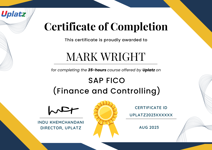
Chief Data Officer (CDO) Premium Career Track
Program consisting of courses to help you fulfil your dream of becoming a C-Level Executive (CDO) in a top organization
Uplatz
Summary
- Uplatz Certificate of Completion - Free
Add to basket or enquire
Overview
Uplatz provides this intense Premium Career Track program on Chief Data Officer (CDO). It is a program covering all topics related to Data, Data Engineering, Data Analytics, Data Visualization, Data Science, Data Governance, and more, as self-paced video lectures. The program will help you pursue a career towards becoming a CDO. You will be awarded Course Completion Certificate at the end of the course.
A Chief Data Officer (CDO) is a senior executive responsible for overseeing an organization's data strategy, management, and governance.
This Premium Career Track - Chief Data Officer (CDO) program by Uplatz includes the following courses:
- Talend
- SAP Data Services (BODS)
- SQL Programming with MySQL Database
- Business Intelligence Specialization
- Power BI
- Tableau
- SAS BI
- Data Visualization in Python
- Data Visualization in R
- Build your Career in Data Science
- Data Science with Python
- Data Science with R
- Machine Learning (basic to advanced)
- Deep Learning Foundation
- Generative AI Specialization
- CISSP (Cybersecurity)
- MS Excel
- Google Sheets
- Cloud Computing Basics
- SAP MDG (Master Data Governance)
Becoming a CDO requires years of experience in data science and data analytics as well as a background in business management and organizational behaviour.
The chief data officer oversees a range of data-related functions that may include data management, ensuring data quality and creating data strategy. He or she may also be responsible for data analytics and business intelligence, the process of drawing valuable insights from data.
Certificates
Uplatz Certificate of Completion
Digital certificate - Included
Course Completion Certificate by Uplatz
Course media
Description
The role of a Chief Data Officer (CDO) has become increasingly important as organizations recognize the value of data as a strategic asset. The CDO is a senior executive responsible for overseeing the organization's data strategy, management, and governance. The specific roles and responsibilities of a Chief Data Officer may vary depending on the organization's size, industry, and data maturity level. However, some common responsibilities of a CDO include:
Data Strategy: Developing and executing a comprehensive data strategy aligned with the organization's business goals and objectives.
Data Governance: Establishing data governance policies, standards, and processes to ensure data quality, accuracy, and consistency across the organization.
Data Management: Overseeing data acquisition, integration, storage, and retrieval processes to ensure data is readily available and usable by relevant stakeholders.
Data Security and Privacy: Implementing data security measures to protect sensitive information and ensuring compliance with data privacy regulations.
Data Analytics and Insights: Leveraging data analytics and business intelligence tools to derive valuable insights from data, enabling data-driven decision-making.
Data Architecture: Defining the organization's data architecture, including data models, data storage, and data flow diagrams to optimize data usage and integration.
Data Integration: Ensuring seamless integration of data from various sources and systems to support business operations and analytical needs.
Data Compliance: Ensuring that data practices comply with industry regulations, data protection laws, and privacy requirements.
Data Quality: Implementing data quality assessments and improvement initiatives to maintain the accuracy and reliability of data.
Data Ethics: Promoting ethical data practices and ensuring data usage aligns with the organization's ethical standards.
Data Collaboration: Facilitating data sharing and collaboration across departments to foster data-driven decision-making and innovation.
Data Culture: Advocating for a data-driven culture within the organization, encouraging data literacy, and promoting data-driven decision-making at all levels.
Data Training and Awareness: Providing data training and awareness programs to employees to enhance data literacy and data management skills.
Data Innovation: Identifying opportunities for data-driven innovation and exploring new technologies and tools to enhance data capabilities.
Data Visualization: Overseeing the creation of data visualizations and reports that effectively communicate insights to stakeholders.
Data Privacy Impact Assessment (DPIA): Conducting DPIAs for new data initiatives to identify and address privacy risks.
Data Monetization: Exploring opportunities to monetize data assets, either through partnerships or data-driven products/services.
Data Storage and Retention: Developing policies for data storage and retention to optimize data storage costs and ensure compliance.
Data Collaboration with External Partners: Collaborating with external partners or third-party data providers to access valuable data sources.
Data Innovation Projects: Leading data-driven innovation projects that leverage data for product development or process improvement.
Data Vendor Management: Managing relationships with data vendors and ensuring data provided meets quality and compliance standards.
Data Compliance Reporting: Providing regular reports on data compliance and data governance efforts to executive leadership and relevant stakeholders.
Data Audit and Risk Assessment: Conducting data audits and risk assessments to identify vulnerabilities and potential data-related risks.
Data Stakeholder Engagement: Engaging with stakeholders across the organization to understand data needs and provide data solutions that align with their requirements.
The Chief Data Officer plays a critical role in driving data-driven decision-making, improving data management practices, and ensuring that data is treated as a strategic asset within the organization. The CDO collaborates with other C-suite executives, including the CEO, CTO, and CIO, to align data initiatives with the organization's overall business strategy.
Who is this course for?
Everyone
Requirements
Passion and determination to make it to the top of the corporate ladder!
Career path
- Chief Data Officer (CDO)
- Chief Data and Analytics Officer (CDAO)
- Chief Data Architect
- Chief Analytics Officer
- Chief Technology Officer (CTO)
- Chief Information Officer (CIO)
- Chief Executive Officer (CEO)
- Enterprise Architect
- Engineering Lead
Questions and answers
Currently there are no Q&As for this course. Be the first to ask a question.
Reviews
Currently there are no reviews for this course. Be the first to leave a review.
Legal information
This course is advertised on reed.co.uk by the Course Provider, whose terms and conditions apply. Purchases are made directly from the Course Provider, and as such, content and materials are supplied by the Course Provider directly. Reed is acting as agent and not reseller in relation to this course. Reed's only responsibility is to facilitate your payment for the course. It is your responsibility to review and agree to the Course Provider's terms and conditions and satisfy yourself as to the suitability of the course you intend to purchase. Reed will not have any responsibility for the content of the course and/or associated materials.



